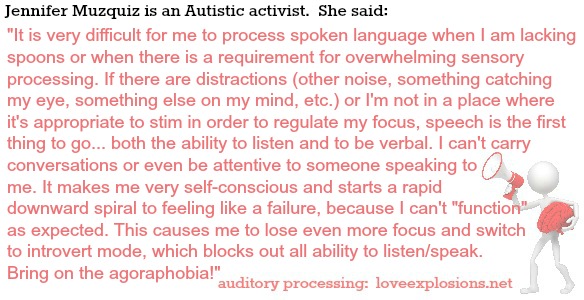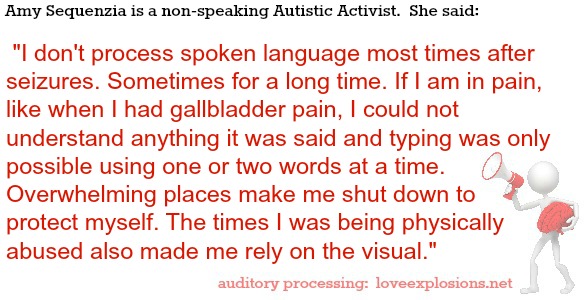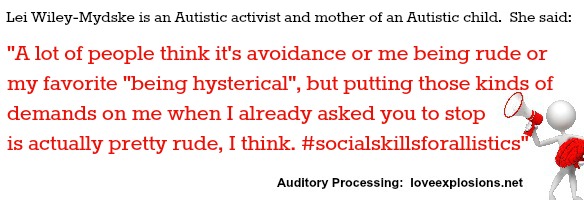****All images in this post should be accessible and coded with alternative text. Please let me know if you have difficulty.
Auditory processing refers to the way that sound is processed after it is heard. A person with Auditory Processing Disorder may have difficulty interpreting sounds they hear–often related to speech. The structure of the ear can be typical while the person experiences varying degrees of difficulty making sense of the sound.
I’ve been giving a lot of thought to raising happy and safe Autistic children. Happy and safe children make parenting them a lot less stressful. So I’m raising a topic that I think plays a major role in the lives of many Autistic children (and adults) unbeknownst to the parents.
It is important not just because it affects communication abilities but because it can lead to extreme frustration and other emotions which can result in unexplained behavior.
Auditory processing difficulties. I don’t know why there is not more of a focus on this as a frequently occurring disability secondary to Autism. In my experience it doesn’t even seem to be on the radar of most professionals.
I will share our diagnostic experience and then some really important things that Autistic adults shared with me about APD.
Special thanks to H for sharing his images.
Read more at Thirty Days of Autism.
Our experience getting Evelyn diagnosed:
Evelyn “passed” her newborn hearing test. When she was about three, we started to notice that she didn’t seem to hearing when we talked to her. We wondered if she was experiencing hearing loss and had her tested again–even though we noted that she heard other noise.
She “passed” the screening again. Her neurologist thought it was worth having an ABR hearing test. This is done under sedation in young children and tests the way the hearing nerve responds to different sounds. She “passed” that too.
After she “passed” that, we were lead to believe that she was simply ignoring us. That this was a behavior. That it needed to be corrected…ABA was apparently the only way to do it.
Fast forward to last school year. Evelyn was seven. I went away for several days which I don’t normally do so it was a big deal. When I came back, Maxine met me at the door and we had a loud greeting. Evie was sitting on the couch playing with her ipad. She didn’t even look up. I started greeting her excitedly.
She didn’t look up until I bent down in front of her and put a hand on her knee. She didn’t know I was there prior to that. I know this because the moment I touched her, she lit up, threw herself at me, and didn’t let go for several minutes.
She wasn’t ignoring me. She didn’t process what she heard.
Because I knew nothing of the possibility of auditory processing difficulties, I had a difficult time wrapping my brain around what was happening. We knew she could hear because she had all of the tests.
Over the next several weeks, I began “testing” her. I would offer her something desirable. She wouldn’t respond without a visual cue. These were words that I knew that she comprehended.
I raised the question at a school meeting. One of the people on her team responded that the team agreed that Evie didn’t seem to process language. I was floored. How had this not come up? How was she not receiving accommodations for this? They told me that only a neurologist could diagnose her with “central auditory processing disorder.”
We went to her neuro. The diagnosis process looked like this: I told him what we’d experienced. He said she has Central Auditory Processing Disorder. He wrote a letter to school saying that she needed accommodation around this disability.
When I think of the ramifications of our failure to detect this disorder, I could cry. Not just the ramifications on speech, language, and academics. But the assumptions everyone made about the function of her behavior and all the ways Evie was offended by those assumptions. This was not Evie being stubborn. This was Evie being disabled in a way that no one seemed to acknowledge as worthy of support.
Lots of Autistic adults were kind enough to share their experiences around APD with me.
As I mentioned, a person could have perfect structural hearing and still experience APD.
You can read Alex’s blog here.

So what happens?
Imagine trying to process what someone is saying when every other sound in the room is competing with that speech. You are unable to block out the other sounds enough to comprehend the speech.
Read Chavisory’s post here.

 It is important to note that auditory processing abilities are not static. They can vary depending on the situation and day.
It is important to note that auditory processing abilities are not static. They can vary depending on the situation and day.
Amy blogs at Non-Speaking Autistic Speaking.

Sparrow blogs at Unstrange Mind.
I would feel so incredibly frustrated if people attributed manifestations of my disability to behavior.
Lei blogs at Autistic Times Two.
And then there are the people that presume that you’re incompetent.
Cynthia blogs at Musings of an Aspie.

Also from Cynthia’s post on the topic:
Every Autistic adult I spoke with seemed to experience some level of auditory processing difficulty. It stands to reason that Autistic children experience the same.
Children might not have the ability to communicate this disability. And it might be difficult for adults to pick up on because it is not necessarily constant. And if the hearing tests come back “normal” and professionals don’t seem to be talking about it….
We are left with an unaccommodated ability which is often written off as behavioral issues.
And of course there is the frustration that is certain when a disability is not supported appropriately which could easily contribute to “behaviors.
Failure to diagnose and accommodate APD can lead not just to frustration, but to difficulty and/or failure to make academic progress.
Say nothing of the social implications.
Auditory Processing Disorder. It is a thing for Autistic people–including kids.
Next post, I will talk about helpful coping strategies that Autistic adults shared with me.





It’s very likely that most kids who experience this don’t realize. I didn’t realize until last year that I lip read to supplement my auditory processing. It’s not a skill I consciously learned or purposely do so I assume I picked it up at a very early age.
That makes sense Cynthia. I will make sure to mention that in part deux. Thank you!
Lip reading is something I’ve recently realized I do. A lot. But it’s not a conscious thing which means I get distracted, especially by other movement in my field of vision. I find it much more difficult to follow somebody who gestures extensively as they speak because all the aimless hand-waving (it’s aimless from my point of view because it doesn’t carry any meaning) merely distracts me from focusing on their words.
Yes, this. I’ve now added labyrinthitis to the nightmarish mix. I sincerely wish I’d learnt lip reading.
Id not even heard of this until a friend got me to read up on autism and comorbids for her daughter.
Cynthia, I didn’t realize it until I was an adult. It was actually my son’s Doc that explained it to me about 5 years ago. When I was a kid I heard what people said to me but I lost the structure. Their sentences broke down and I had to figure out how to put all the words back together in a coherent sentence (hence the slower processing time). My biggest issue now is filtering foreground and background noises – everything is just loud to me.
Yes! I’m 42…only figured out the auditory processing problem recently, but I can see now how it caused problems all along. I really would have appreciated a diagnosis in my childhood!
I agree that it’s a very under-diagnosed factor. We’ve been fortunate with our son, in that I have a mild form of auditory processing disorder (which has never been formally recognised and is made somewhat more difficult to differentiate because I also have physical hearing damage/loss). So we were able to recognise his own auditory processing disorder very early on because it’s something I myself are familiar with, and whilst it’s never been something formally diagnosed in his case (I’m not even sure if it is usually diagnosed separately in Australia), his aides and teachers at school are all aware of it and factor it accordingly in his accommodations.
I found Chavisory’s observation about visual hearing really interesting (and musingofanaspie’s comment too) – I have difficultly if I don’t have a visual reference and I’ve always subconsciously lip-read and also didn’t realise this until only very recently, I figured it had more to do with my physical hearing loss. I struggle in noisy environments and again, put it down to the hearing loss. Reading this post has made me think that auditory processing has actually played a much more significant part than what I have imagined.
Oh, I had SO MANY hearing tests come back perfect. I got hearing-tested more than any other kid in my school, I swear I was getting tested at least twice a year, because teachers must’ve thought it looked like I couldn’t hear.
But the “testing” involved going alone to the quiet, calm nurse’s office, where, over a headset, I had to distinguish the directionality of a single tone at a time.
Which was just so not the problem.
or worse the tests where the see if you’re sensitive to specific ranges of sound… i scared a nurse once by ripping the headset off and tossing it across the room in pain, to which i sheepishly apologized.
thankfully she was understanding, and consoled me with the fact that it was clear to her that my hearing was fine and that i did indeed have APD :p
Thank you for posting about this. It’s one of the most disabling aspects of my neurological makeup.
Could you please fix the alt text for “apd cynthia 1”? (It’s the image immediately after “Cynthia blogs at Musings of an Aspie”.)
Thanks for letting me know! I’ve edited the alt text. 🙂
Not sure if my comment posted the first time, but the alt text on the image immediately after “Cynthia blogs at Musings of an Aspie” is wrong. I have trouble reading the red text especially with the JPEG compression artifacts, but it clearly doesn’t say “apd cynthia 1”.
Pingback: Auditory Processing Disorder info | lovenlearning
sometimes i wonder how much APD plays into the speech problems that those of us on the spectrum have, especially when you listen to the younger folks attempting to vocalize… they tend to use a lot of vowel sounds.
for me, i find that consonants are difficult, to impossible to hear depending on the level of background noise. and i often find myself slurring vowel sounds together even today because of it.
this is even more pronounced after a seizure or a long day of over-stiming environments.
Fascinating…..both of my grandsons are autistic. Sam, the 13 year old is nonverbal. His older brother has APD……what can we do to make the disorder more manageable?…
Can we speak in a different way? Can we use better body language?
Lip reader here as well – I need the visual to help translate the sounds in my head, I can’t actually lip read if, say, I turn the volume on the television off. Added “bonuses” (really not bonuses): people think it’s eye contact and use it as a reason to dismiss your autism and men think you’re flirting because you’re so focused on their mouths. Ugh.